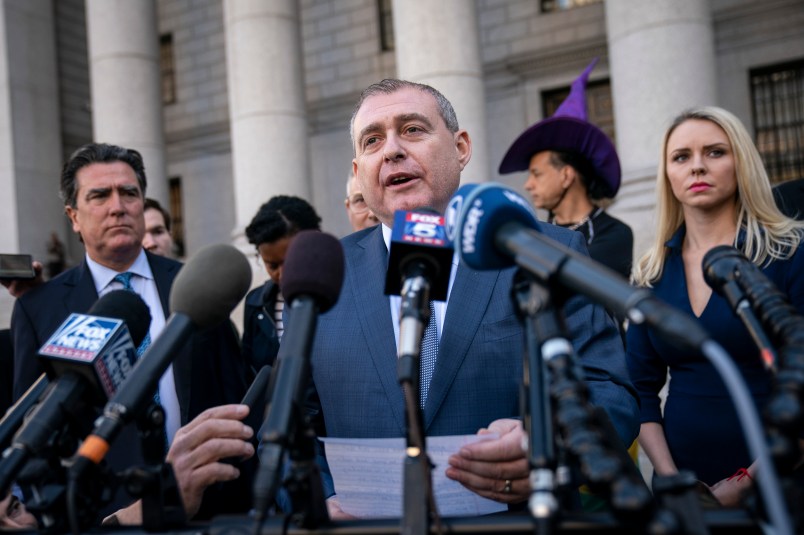It is becoming increasingly clear that President Trump’s pressure campaign on Ukraine began long before President Volodymyr Zelensky took power in May 2019, and likely extended far back into the tenure of his predecessor.
While the notorious phone call between Trump and Zelensky in July 2019 prompted the whistleblower complaint that ultimately led to impeachment, there have long been suggestions that the pressure campaign waged by Trump and his personal attorney Rudy Giuliani began during the previous administration of Ukrainian President Petro Poroshenko, who served from 2014 to early 2019.
Giuliani’s former friend-slash-henchman Lev Parnas confirmed that he had tried to strike a deal on the President’s attorney’s behalf with Poroshenko in a meeting in Kyiv whereby Ukraine would announce “investigations” into the Bidens.
“The first quid pro quo was when we met with President Poroshenko,” Parnas said in a Wednesday night interview with CNN.
Parnas met with Poroshenko in February 2019, the Wall Street Journal reported.
When asked by CNN host Anderson Cooper what the “message to Poroshenko” was, Parnas outlined the terms of the deal: “If [Poroshenko] would make the announcement, then he would get — Trump would either invite him to the White House or make a statement for him, but basically start supporting him for, you know, president.”
At the time, Poroshenko was fighting a losing battle for reelection in a campaign against Zelensky.
Once Zelensky was elected, TPM reported in November, the pressure campaign was forced to pivot in order to deal with a new Ukrainian leader.
Parnas’ account appears to confirm that the pressure on Zelensky followed serious pressure on Poroshenko.
Volodymyr Fesenko, a Kyiv-based political analyst, told TPM last year that “there was pressure on Poroshenko going back years.”
There is some evidence in the public record to support this. Much of it begins with the 2016 presidential campaign.
Trump and his allies have long believed that the Poroshenko administration interfered in the 2016 election by leaking damaging information about Paul Manafort’s business dealings while he was working as a political consultant in Ukraine.
In one text,
Other texts released by Parnas attorney Joe Bondy to House panels investigating the President show Lutsenko negotiating with Parnas in early March over a potential interview with Poroshenko.
“These questions are not for a sitting President,” Lutsenko wrote Parnas on March 8. “In the heat of the campaign he cannot answer questions about the ambassador [Marie Yovanovitch], Biden, etc.”
It remains unclear if whatever interview Parnas and Lutsenko were contemplating was to be a part of the “quid pro quo” that Parnas offered Poroshenko at their February meeting in Kyiv.
That offer, however, followed years of mutually beneficial arrangements between Kyiv and the Trump administration. Many of those revolved around the Manafort case, and the persistent belief among those around Trump that the Ukrainian government fabricated a ledger released in August 2016 showing Manafort’s name next to $12.7 million in alleged bribe payments. Or as Giuliani phrased it in a May 2019 text to Parnas, the scandal had to do with “delivering fraudulent evidence falsely accusing the campaign.”
A similar allegation was made in a lawsuit filed in 2017 by a member of Poroshenko’s political party named Boryslav Rozenblat, who claimed that Manafort had been defamed as part of a plot by the Ukrainian government to hurt Trump and help the electoral hopes of Hillary Clinton.
Suggestions that the Poroshenko administration tried to deliver on political points that were beneficial to Trump also extend to the country’s faltering cooperation with the investigation of special counsel Robert Mueller.
In April 2018, Lutsenko reportedly froze the country’s investigations into Manafort and halted any pending cooperation that it had with the Mueller investigation. That took place just as the Trump administration followed through on a key piece of security assistance: the delivery of sought-after Javelin anti-tank missile systems, a crucial piece of lethal security assistance for the country in its search to beef up its defenses against the Russian army.
Some efforts appear to have come from the Ukrainian side to sweeten the political environment in which Kyiv was operating. The Poroshenko government signed a lucrative deal to buy locomotives from General Electric in 2017, for example. And in July 2017, Poroshenko arranged a deal whereby a state-owned Ukrainian company would buy Pennsylvania anthracite coal at above-market rates.
That deal “was done for political reasons,” according to Oleksandr Paraschiy, a Kyiv investment banker.






